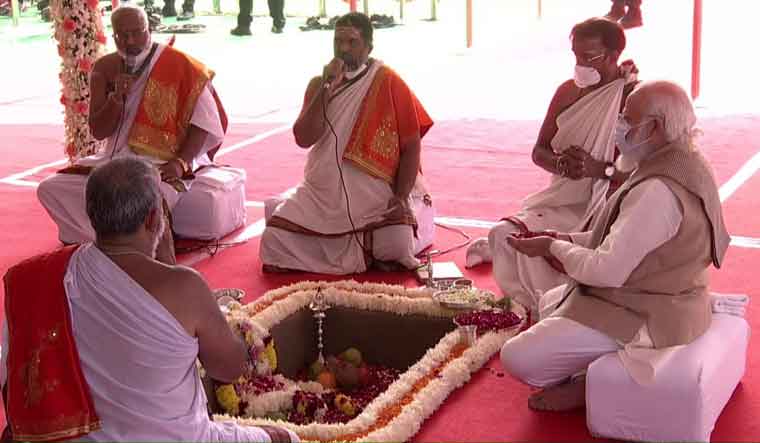Manas Dasgupta
NEW DELHI, Dec 10: Ninety-nine years after the then British government laid the foundation stone of the Indian Parliament, the prime minister Narendra Modi on Thursday laid the foundation stone of a new Parliament complex, a “new milestone in India’s democratic history.”
“If the old Parliament House gave direction to India post-independence, the new building would be a witness to the creation of a self-reliant India,” Modi said speaking on the occasion.
The foundation stone of the present Parliament house was laid on February 12, 1921, and the construction was completed in six years at a cost then of Rs 83 lakhs. The new complex has been targeted to be completed expeditiously by 2022 when the country celebrate the 75th year of independence with enhanced seating capacity at a cost of about Rs 971 crores.
Modi said the new Parliament house would “exemplify the existence of the new and the old” and added, “If work was done to fulfill the needs of the country in the old Parliament building, then the aspirations and ambitions of 21st century India will be fulfilled in the new building,” he said.
“This is a day of pride for over 130 crore Indians when we are witnessing this historic moment. The new Parliament building is an example of the co-existence of the new and the old. This is an effort to make changes within oneself in accordance with the time and needs,” he further said.
Modi gave a call to the people of India to build this new building of Parliament together. He said it could not be “more beautiful or more pure than the new building of our Parliament witnessing when India celebrates 75 years of its independence.”
Amid the continuing standoff between farmers, particularly from Punjab and Haryana, and the Centre over the contentious farm laws, Mod invoked the teachings of Guru Nanak, asserting that “dialogue must go on”.
“Apart from governance, democracy has always been a medium to resolve differences of opinion. Differences strengthen a democracy. While there should be space for differences, there should not be any disconnect,” Modi said.
Citing the teachings of Nanak, the founder of Sikhism, the PM said, “Guru Nanak had said, ‘jabtak sansar rage, tabtak sambad rahe’ (so long as the world exists, dialogue must go on). Speaking and listening is at the heart of dialogue. This is the soul of democracy. There can be differences in policies and politics but there should not be any differences in the end goal of serving people.”
The Prime Minister recalled the moment when he entered the Parliament House for the first time in 2014 as an MP. He said he bowed his head and saluted this temple of democracy, before stepping into it. He remarked that many new things were being added in the new Parliament House that would increase the efficiency of the MPs and modernize their work culture.
The Prime Minister also drew the irony of some other countries trying to teach democracy to India where democratic structure has already taken deep roots. He remarked that democracy elsewhere was about election procedures, governance and administration. But democracy in India was about life values, “it is the way of life and the soul of a nation.” He added India’s democracy was a system developed through centuries of experience. “There is also a life mantra, an element of life as well as a system of order in the democracy in India. It is India’s democratic strength that is giving new energy to the development of the country and giving new faith to its countrymen. Democracy in India is constantly being renewed every year and it is seen that voter turnout is increasing with every election,” he said.
The Prime Minister remarked that democracy in India had always been a means of resolving differences along with governance. Different views, different perspectives empower a vibrant democracy. He said India’s democracy has moved forward with the goal that there is always room for differences so long as it is not entirely disconnected from the process. He stressed that policies and politics may vary but “we are for the service of the public and there should be no differences in this ultimate goal.”
Modi urged the people to take the pledge to keep “India First,” to worship only the progress of India and the development of India, every decision should increase the strength of the country and that the country’s interest was paramount. He asked everyone to take the pledge that there would be no greater interest for them than national interest, concern for the country more than their personal concerns and nothing more important than the unity, integrity and dignity of the country.
The Prime Minister also delved into democratic history of India, saying the texts available here were older than the Magna Carta, which is considered the foundation of democracy. “Magna Carta was written in 13th century, but philosopher Basavanna envisioned a public Parliament in 12th century in the form of Anubhav Mantapa,” he said. “If we go back further, some ancient inscriptions in Tamil Nadu from 10th century talk about categorising villages into groups – like modern day wards. They also talked about disqualifying a public representative from contesting elections. The criteria was to declare the contestants and their relatives’ assets,” he added.
The foundation stone laying ceremony was attended among others by the union home minister Amit Shah, defence minister Rajnath Singh, information minister Ravi Shankar Prasad, Lok Sabha speaker Om Birla and some foreign invitees.
The new building will also have a grand Constitution Hall to showcase India’s democratic heritage, a lounge for members of Parliament, a library, multiple committee rooms, dining areas and ample parking space. The Lok Sabha chamber will have a seating capacity for 888 members, while Rajya Sabha will have 384 seats, keeping in mind the future increase in the number of members of the two houses.

